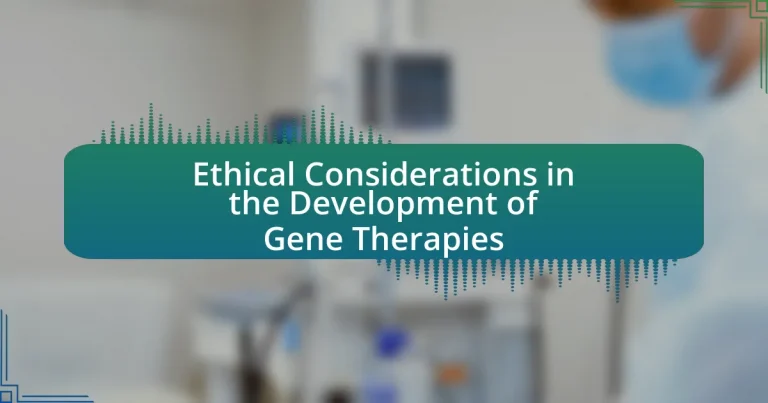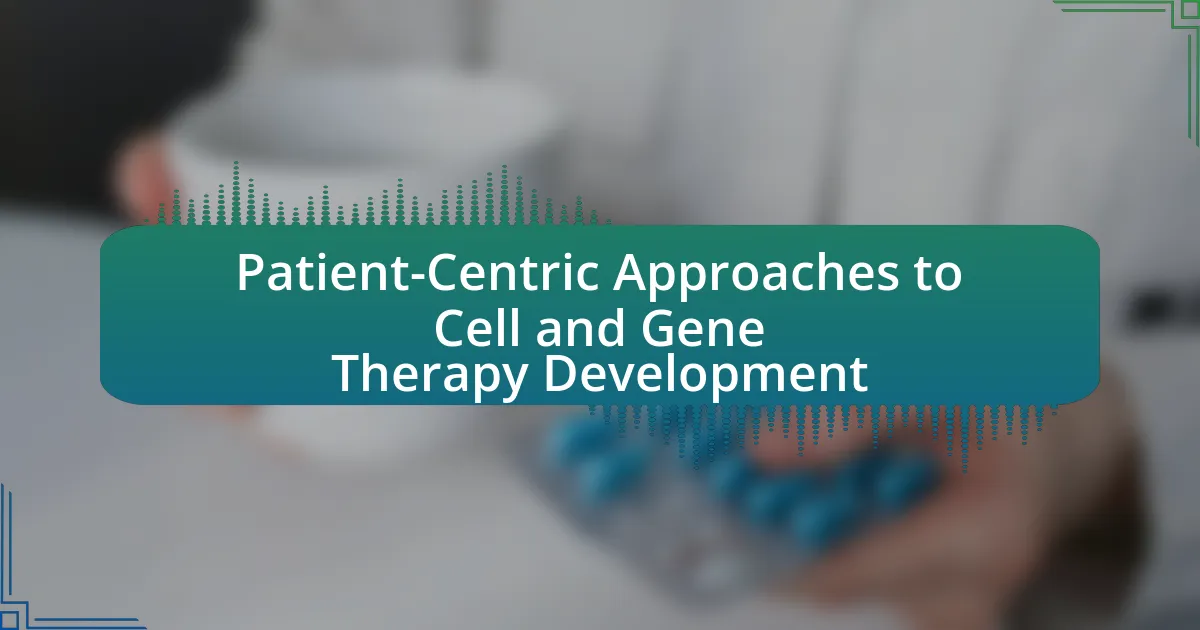The article focuses on the ethical considerations in the development of gene therapies, addressing critical issues such as informed consent, equity in access, and the potential long-term effects on individuals and populations. It highlights the importance of ethical frameworks, guided by principles like respect for persons and justice, to ensure patient safety and fairness in treatment availability. The discussion includes ethical dilemmas arising from gene therapy research, the impact of societal values and cultural perspectives on ethical views, and the role of regulatory organizations in enforcing ethical standards. Additionally, the article explores future directions for ethical gene therapy development, emphasizing the need for transparency, public engagement, and best practices to enhance ethical training for professionals in the field.

What are the Ethical Considerations in the Development of Gene Therapies?
The ethical considerations in the development of gene therapies include issues of consent, equity, and potential long-term effects on individuals and populations. Informed consent is crucial, as patients must fully understand the risks and benefits before undergoing treatment. Equity concerns arise regarding access to these therapies, as disparities may exist based on socioeconomic status or geographic location. Additionally, the potential for unintended consequences, such as off-target effects or germline modifications, raises questions about the long-term implications for future generations. These considerations are underscored by guidelines from organizations like the World Health Organization, which emphasize the need for ethical frameworks in biomedical research.
Why is ethics important in gene therapy development?
Ethics is crucial in gene therapy development because it ensures the safety, efficacy, and fairness of treatments. Ethical considerations guide researchers in addressing potential risks, such as unintended genetic modifications and long-term effects on patients and future generations. For instance, the Belmont Report emphasizes respect for persons, beneficence, and justice, which are foundational principles in biomedical research. Adhering to these principles helps prevent exploitation of vulnerable populations and promotes informed consent, thereby fostering public trust in gene therapy advancements.
What ethical dilemmas arise during gene therapy research?
Ethical dilemmas in gene therapy research include issues of consent, potential for unintended consequences, and equity in access to treatments. Informed consent is critical, as participants must fully understand the risks and benefits, yet complexities in gene editing may hinder this understanding. Additionally, the possibility of off-target effects raises concerns about the safety and long-term implications of gene modifications. Equity is another significant dilemma, as disparities in access to advanced therapies could exacerbate existing health inequalities. These ethical considerations are underscored by historical instances, such as the controversy surrounding the CRISPR babies in China, which highlighted the urgent need for ethical frameworks in gene therapy research.
How do ethical considerations impact patient consent?
Ethical considerations significantly impact patient consent by ensuring that patients are fully informed and able to make autonomous decisions regarding their treatment options. In the context of gene therapies, ethical principles such as respect for autonomy, beneficence, and non-maleficence guide the consent process, requiring healthcare providers to disclose potential risks, benefits, and alternatives to the patient. For instance, the Belmont Report emphasizes the necessity of informed consent in research involving human subjects, highlighting that patients must understand the implications of participating in gene therapy trials. This ethical framework not only protects patient rights but also fosters trust in the healthcare system, ultimately influencing the willingness of patients to consent to innovative treatments.
What are the potential risks associated with gene therapies?
The potential risks associated with gene therapies include unintended genetic changes, immune reactions, and the possibility of tumor formation. Unintended genetic changes can occur when the therapy inadvertently alters other genes, leading to unforeseen consequences. Immune reactions may arise as the body recognizes the introduced genetic material as foreign, potentially causing inflammation or other adverse effects. Additionally, certain gene therapies, particularly those involving oncogenes, carry the risk of promoting tumor growth, as evidenced by cases in clinical trials where patients developed cancers post-treatment. These risks highlight the need for thorough evaluation and monitoring in gene therapy applications.
How do unintended consequences affect ethical decision-making?
Unintended consequences significantly impact ethical decision-making by introducing unforeseen outcomes that can contradict the original ethical intentions. In the context of gene therapies, decisions made with the aim of improving health can lead to adverse effects, such as genetic discrimination or unforeseen health complications. For instance, the introduction of gene editing technologies like CRISPR has raised ethical concerns regarding potential long-term effects on human genetics, which were not fully understood at the time of their development. This highlights the necessity for comprehensive risk assessments and ethical frameworks to guide decision-making processes, ensuring that potential unintended consequences are considered and addressed proactively.
What role does risk assessment play in ethical evaluations?
Risk assessment plays a critical role in ethical evaluations by identifying potential harms and benefits associated with gene therapies. This process enables stakeholders to weigh the risks of adverse effects against the therapeutic advantages, ensuring informed decision-making. For instance, the National Institutes of Health emphasizes that thorough risk assessments are essential for evaluating the safety and efficacy of gene therapies, which directly influences ethical considerations regarding patient consent and societal impact. By systematically analyzing risks, ethical evaluations can better address concerns related to equity, access, and long-term consequences of gene therapies.
How do societal values influence gene therapy ethics?
Societal values significantly influence gene therapy ethics by shaping public perceptions of acceptable practices and guiding regulatory frameworks. For instance, values surrounding individual autonomy and informed consent dictate that patients must have the right to make informed decisions about their treatment options, including gene therapy. Additionally, societal concerns about equity and access can lead to ethical debates regarding the distribution of gene therapies, particularly if they are expensive or not widely available. Research indicates that cultural attitudes towards genetic modification, such as fears of “designer babies,” can also impact ethical guidelines, as seen in various surveys where public opinion varies widely across different regions and demographics. Thus, societal values play a crucial role in determining the ethical landscape of gene therapy, influencing both the development and implementation of these technologies.
What cultural perspectives shape ethical views on gene therapies?
Cultural perspectives that shape ethical views on gene therapies include religious beliefs, societal norms, and historical contexts. For instance, in many Western cultures, individualism and the pursuit of personal health improvements drive acceptance of gene therapies, while in some Eastern cultures, collectivism may prioritize community health and ethical considerations regarding genetic modifications. Additionally, religious perspectives, such as those from Christianity or Islam, often influence views on the sanctity of life and the morality of altering human genetics. Historical experiences with medical interventions, such as eugenics movements, also inform contemporary ethical debates, leading to skepticism or support for gene therapies based on past abuses. These cultural factors collectively shape the ethical landscape surrounding gene therapies, influencing public opinion and policy decisions.
How do public opinions affect regulatory frameworks?
Public opinions significantly influence regulatory frameworks by shaping policymakers’ decisions and priorities. When a substantial portion of the public expresses concerns or support for specific issues, such as ethical considerations in gene therapies, regulators often respond by adjusting existing laws or creating new regulations to align with societal values. For instance, public apprehension regarding the safety and ethical implications of gene editing technologies has led to stricter oversight and guidelines in various countries, reflecting a direct response to citizen sentiment. This dynamic illustrates how public discourse can drive regulatory change, ensuring that frameworks remain relevant and reflective of community standards and ethical considerations.
What are the implications of gene editing technologies?
Gene editing technologies have significant implications, particularly in the realms of healthcare, agriculture, and ethics. In healthcare, these technologies can potentially cure genetic disorders by directly modifying the genes responsible for diseases, as demonstrated by CRISPR’s success in treating conditions like sickle cell anemia. In agriculture, gene editing can enhance crop resilience and yield, addressing food security challenges. However, ethical concerns arise regarding the potential for unintended consequences, such as off-target effects, and the moral implications of altering human embryos, which raises questions about designer babies and genetic inequality. These implications necessitate careful consideration of regulatory frameworks and societal impacts to ensure responsible use of gene editing technologies.
How do we balance innovation with ethical responsibility?
Balancing innovation with ethical responsibility in gene therapies requires a framework that prioritizes patient safety, informed consent, and equitable access. Regulatory bodies, such as the FDA, enforce guidelines that ensure new therapies undergo rigorous testing for safety and efficacy before approval, thus protecting patients. Additionally, ethical considerations must include transparent communication with patients about potential risks and benefits, as highlighted by the Belmont Report, which emphasizes respect for persons, beneficence, and justice in research. This approach ensures that while innovation progresses, it does so within a context that safeguards human rights and promotes social equity.

What are the Regulatory Frameworks Governing Gene Therapies?
Regulatory frameworks governing gene therapies include guidelines and regulations established by agencies such as the U.S. Food and Drug Administration (FDA), the European Medicines Agency (EMA), and other national regulatory bodies. These frameworks ensure the safety, efficacy, and ethical considerations of gene therapies through rigorous preclinical and clinical trial requirements, manufacturing standards, and post-market surveillance. For instance, the FDA’s guidance documents outline the necessary steps for Investigational New Drug (IND) applications, emphasizing the need for comprehensive data on the therapy’s effects and potential risks. Similarly, the EMA has established the Advanced Therapy Medicinal Products (ATMP) regulation, which specifically addresses gene therapies, ensuring they meet stringent quality and safety standards before approval.
What organizations oversee gene therapy regulations?
The organizations that oversee gene therapy regulations include the U.S. Food and Drug Administration (FDA), the European Medicines Agency (EMA), and the National Institutes of Health (NIH). The FDA is responsible for ensuring the safety and efficacy of gene therapies in the United States, while the EMA performs similar functions in Europe. The NIH provides guidelines and oversight for gene therapy research, particularly in the context of ethical considerations and safety protocols. These organizations establish regulatory frameworks that govern the development, testing, and approval of gene therapies, ensuring compliance with safety standards and ethical practices.
How do these organizations enforce ethical standards?
Organizations enforce ethical standards through a combination of regulatory frameworks, oversight committees, and adherence to established guidelines. Regulatory bodies, such as the Food and Drug Administration (FDA) and the European Medicines Agency (EMA), set specific ethical guidelines for gene therapy research and clinical trials, ensuring compliance with safety and efficacy standards. Oversight committees, including Institutional Review Boards (IRBs), review research proposals to ensure ethical considerations are met, protecting participant rights and welfare. Additionally, organizations often adopt codes of conduct and ethical guidelines from professional associations, such as the American Society of Gene & Cell Therapy, which provide a framework for ethical practices in gene therapy development. These mechanisms collectively ensure that ethical standards are upheld in the field of gene therapies.
What are the key regulations impacting gene therapy development?
The key regulations impacting gene therapy development include the FDA’s guidance on gene therapy products, the European Medicines Agency’s regulations, and the NIH’s Recombinant DNA Advisory Committee guidelines. The FDA requires preclinical and clinical data demonstrating safety and efficacy before approval, while the EMA mandates compliance with the Advanced Therapy Medicinal Products regulation, which ensures rigorous evaluation of gene therapies. Additionally, the NIH guidelines oversee research involving recombinant DNA, emphasizing safety and ethical considerations. These regulations collectively ensure that gene therapies are developed responsibly, prioritizing patient safety and ethical standards in medical research.
How do regulations address ethical concerns in gene therapies?
Regulations address ethical concerns in gene therapies by establishing guidelines that ensure safety, efficacy, and informed consent. Regulatory bodies, such as the U.S. Food and Drug Administration (FDA) and the European Medicines Agency (EMA), require comprehensive preclinical and clinical trial data to assess the risks and benefits of gene therapies. These regulations mandate that patients receive clear information about potential risks, benefits, and alternatives, thereby promoting informed consent. Additionally, ethical review boards evaluate the ethical implications of gene therapy research, ensuring that studies adhere to ethical standards. For instance, the FDA’s guidance on gene therapy emphasizes the importance of long-term follow-up to monitor potential adverse effects, reinforcing the commitment to patient safety and ethical responsibility in gene therapy development.
What guidelines exist for ethical research practices?
Ethical research practices are guided by principles such as respect for persons, beneficence, and justice. These principles are outlined in documents like the Belmont Report, which emphasizes informed consent, risk-benefit analysis, and equitable selection of subjects. Additionally, the Declaration of Helsinki provides ethical guidelines for medical research involving human subjects, stressing the importance of participant welfare and the necessity of ethical review by independent committees. These guidelines ensure that research is conducted responsibly, prioritizing the rights and well-being of participants while advancing scientific knowledge.
How do regulations ensure patient safety and informed consent?
Regulations ensure patient safety and informed consent by establishing strict guidelines that healthcare providers and researchers must follow. These regulations, such as the Common Rule and the FDA’s regulations for clinical trials, mandate that patients receive comprehensive information about the risks, benefits, and alternatives to proposed treatments, allowing them to make informed decisions. For instance, the requirement for Institutional Review Boards (IRBs) to review research protocols ensures that ethical standards are upheld, protecting participants from harm. Additionally, regulations enforce the necessity of obtaining explicit consent from patients before any treatment, ensuring that their autonomy is respected and that they are fully aware of what participation entails.

What are the Future Directions for Ethical Gene Therapy Development?
Future directions for ethical gene therapy development include enhancing regulatory frameworks, promoting equitable access, and ensuring informed consent processes. Regulatory frameworks must evolve to address the complexities of gene editing technologies, as seen with the rapid advancements in CRISPR and other gene-editing tools. Promoting equitable access is crucial to prevent disparities in treatment availability, as highlighted by the World Health Organization’s emphasis on universal health coverage. Additionally, informed consent processes need to be transparent and comprehensive, ensuring patients fully understand the implications of gene therapies, as supported by guidelines from the National Institutes of Health. These directions aim to balance innovation with ethical responsibility in gene therapy.
How can ethical frameworks evolve with technological advancements?
Ethical frameworks can evolve with technological advancements by integrating new insights and challenges posed by emerging technologies. As gene therapies develop, ethical considerations must adapt to address issues such as consent, equity in access, and long-term effects on human genetics. For instance, the rapid advancement of CRISPR technology has prompted discussions about the implications of gene editing on future generations, necessitating updates to ethical guidelines to ensure responsible use. Historical examples, such as the establishment of the Nuremberg Code in response to unethical medical practices, illustrate how ethical standards can shift in response to technological capabilities and societal values.
What role do stakeholders play in shaping future ethics?
Stakeholders play a crucial role in shaping future ethics by influencing the ethical frameworks and guidelines that govern gene therapy development. Their diverse perspectives, including those from patients, healthcare providers, researchers, and regulatory bodies, contribute to a comprehensive understanding of ethical implications. For instance, patient advocacy groups often highlight the importance of informed consent and equitable access, which can lead to the establishment of ethical standards that prioritize patient rights and welfare. Additionally, regulatory agencies, such as the FDA, incorporate stakeholder feedback into policy-making processes, ensuring that ethical considerations are aligned with public expectations and scientific advancements. This collaborative approach fosters a dynamic ethical landscape that evolves with societal values and technological progress.
How can public engagement improve ethical standards?
Public engagement can improve ethical standards by fostering transparency and accountability in the development of gene therapies. When the public is actively involved in discussions about gene therapy, it encourages stakeholders to consider diverse perspectives and ethical implications, leading to more informed decision-making. Research indicates that public consultations can reveal community values and concerns, which can then be integrated into ethical guidelines. For example, the National Institutes of Health (NIH) emphasizes the importance of public input in shaping research priorities and ethical frameworks, demonstrating that inclusive dialogue can enhance the ethical rigor of scientific advancements.
What best practices can guide ethical gene therapy development?
Best practices that can guide ethical gene therapy development include ensuring informed consent, conducting thorough risk assessments, and promoting equitable access to therapies. Informed consent requires clear communication about the potential risks and benefits of gene therapy, allowing patients to make educated decisions. Thorough risk assessments involve evaluating both short-term and long-term effects of gene modifications, ensuring patient safety and minimizing unintended consequences. Promoting equitable access addresses disparities in healthcare, ensuring that all populations can benefit from advancements in gene therapy, as highlighted by the World Health Organization’s emphasis on health equity.
How can researchers ensure transparency in their work?
Researchers can ensure transparency in their work by openly sharing their methodologies, data, and findings with the scientific community and the public. This practice includes publishing detailed protocols, making raw data available for peer review, and disclosing any conflicts of interest. For instance, the International Committee of Medical Journal Editors emphasizes the importance of data sharing to enhance reproducibility and trust in research outcomes. By adhering to these standards, researchers contribute to a culture of accountability and integrity in the field of gene therapy development.
What strategies can enhance ethical training for professionals?
To enhance ethical training for professionals, implementing case-based learning and interdisciplinary collaboration is essential. Case-based learning allows professionals to engage with real-world scenarios, fostering critical thinking and ethical decision-making skills. Interdisciplinary collaboration encourages diverse perspectives, which can illuminate ethical dilemmas from multiple angles, leading to more comprehensive understanding and solutions. Research indicates that programs incorporating these strategies result in improved ethical reasoning and application in practice, as evidenced by studies showing increased ethical awareness and decision-making capabilities among participants.




